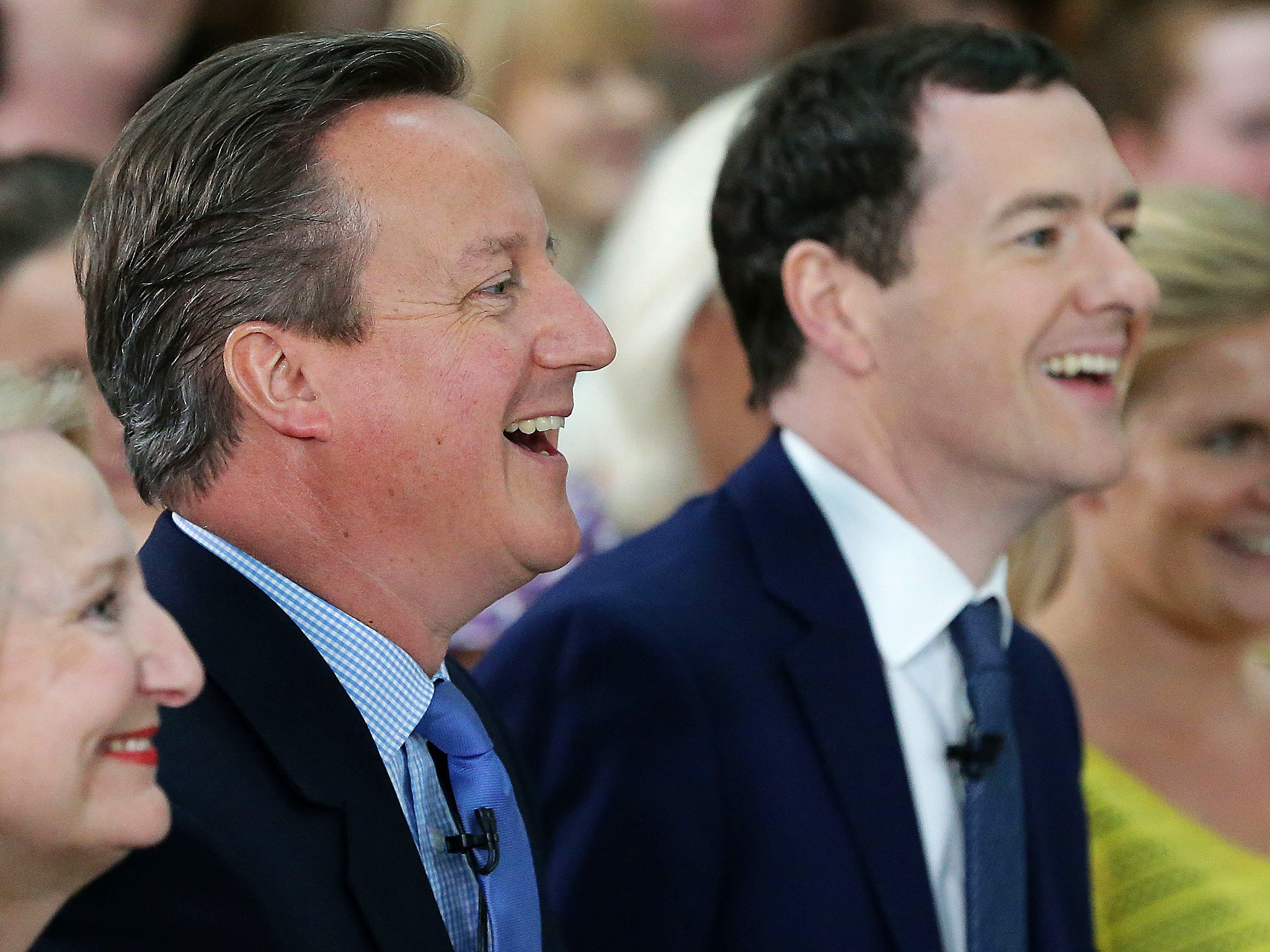Our leaders are willing to wreck their reputations to be paid £8,000 a minute – and there's nothing we can do to stop them
In the months following his departure from Number 11, George Osborne received £320,000 on top of his MP's salary for speeches given in the US. One wonders how he made ends meet

The news that David Cameron and George Osborne have been shipped off to the World Economic Forum in Davos (flights paid for, of course) to deliver speeches for financial institutions for fees reaching the tens of thousands is of no surprise. The two have vast experience within global finance, one being the ex-Chancellor of the Exchequer, the other the former leader of the United Kingdom. Their approach to global finance may be tenuous, considering some of the decisions that made during their tenure, but nevertheless they have a wealth of experience between them, and probably can give a fair amount of advice at the summit.
The issue with this lies not with their inclusion – but the financial remuneration for their involvement.
David Cameron is a free agent now. The issue with him taking such large sums of money for his ‘expertise’ is that he has gained exponentially from stepping down as PM and an MP. He was, undeniably, rich beforehand – but now that he has a good few years of senior political experience under his belt, he is now well sought after.
Despite the fact that he promised he would not abandon the country after the Brexit vote (“Brits don’t quit”), he has done exactly that and a gained a few hundred thousand along the way. Meanwhile, the country prepares itself for further austerity should the Brexit deal go horribly wrong. David Cameron’s situation is more of a moral, as opposed to an ethical, dilemma.
As for George Osborne, shortly before he was demoted to the backbenches he cut the banking levy paid by major financial institutions – a supposed bid to persuade HSBC to maintain its headquarters in the UK. Osborne may not have received money from HSBC while he was Chancellor (so, importantly, no rules have been broken) but he certainly is now – does this not raise a conflict of interest? If Osborne did not have the opportunity in the future to gain monetarily from the financial institutions, would he have focussed less on appeasing them as Chancellor?
This is, of course, pure conjecture – but this manner of leaving high office and becoming a sought after speaker is something of a career path. It has now become the norm for ex-Prime Ministers and Chancellors to divvy off their services for huge sums once they have stepped down – they have the ability to almost quadruple their income for lecturing a room of 20 fatcats. For example, George Osborne, in the months following his departure from Number 11, received £320,000 on top of his salary for speeches given in the US. Evidently he was struggling to handle his living costs after dropping from a salary of £134,565 to £74,962. One wonders how he made ends meet.
Tony Blair also earned vast amounts of money from speeches after stepping down – it has been estimated that he earns $10,000 a minute (which equates to £8127.44 with the current exchange rate) during his speeches (this means it took him approximately 3.2 minutes to earn the UK average wage). Gordon Brown followed the same route – on his speaker page, his fee range is listed as “please inquire”. I don’t think he’ll be starting the bidding from a tenner, do you?
The fact that there is such a huge incentive to leave public office and pursue a career as a speaker needs to be assessed. But it would be difficult to put a ban on politicians speaking for three years after they have stepped down from the cabinet, as how would this be policed, and could it legally be implemented? A ban could be put on companies hiring such speakers (as our economics expert Hamish McRae informs me) but how would that stop companies outside of the UK? The big money is made on Wall Street – there is not much we can do about that, except boo and hiss.
We could sitting MPs from joining the boards of public companies, given the fact that they could have substantial influence over such industries in the future. However, we can’t stop MPs receiving fees and saying what they want to say – because where would the line be drawn?
Hillary Clinton, before her presidential bid, earned millions giving speeches on Wall Street and the same could be true of George Osborne should he re-join the cabinet or launch a leadership bid in the future. Taking money from financial institutions and then potentially having direct influence over their regulation in the future does not seem tolerable – it potentially sits under the “cash for access” umbrella – but because the money is accepted prior to the incumbent having the power over their regulation, it is deemed acceptable.
What is damaging for sitting MPs is their reputation – by using their former office to further their monetary gains, they are effectively damaging their future political ambitions – making it very hard for them to reassume high office following such speeches. Arguably, Hillary Clinton’s presidential bid was damaged by her Wall Street speeches, and Tony Blair, although he has no political ambitions that we know of, has similarly train-wrecked his reputation by receiving such sums.
The choice is clear: you can have the money or the glory, but never both.


Join our commenting forum
Join thought-provoking conversations, follow other Independent readers and see their replies